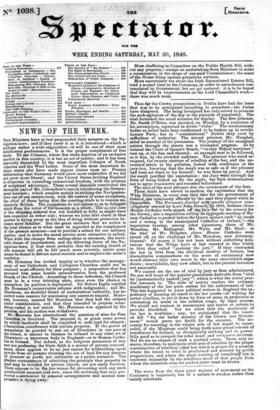NEWS OF THE WEEK.
THE Ministers have at last propounded their measure on the Na- vigation-laws; and if they carry it as it is introduced—which is perhaps rather a wide supposition—it will be one of their most satisfactory performances. It is the proper complement of free trade. To our Colonies, whom free trade deprives of an exclusive
market in this country, it is but an act of justice•' and it has been
expressly demanded by the most important Colonies of North America and the West Indies. Some of the most important fo- reign states also have made urgent claims upon us : Prussia threatening that Germany would grow more restrictive if we did not grow more liberal; and the United States inviting England to cooperate in extending commercial freedom, with the promise of reciprocal advantage. These several demands constituted the strongest pert of Mr. Labouchere's casein introducing the Govern- ment measure; which consists mainly in striking the Navigation- laws out of our statute-book, with the reserve of some exceptions, the chief of them being that the coasting-trade is to remain ex- elusively British. The exceptions do not appear to us to derogate-
much from the value of-th4 measure as a whole. The 4.-•cial case of the shippiag, interest was not handled so fully as might have
been expected on either side; whence we infer that alarm in that
quarter is dying away as the idea of doing without protection be- comes more familiar. But the great omission that we notice is
the total silence as to what must be regarded as the complement of the present measure—one to provide a school for our military marine, and to make the naval service more attractive to sailors.
What with the change from sailing-ships to steamers, the inevi- table disuse of impressment, and the throwing down of the Na- vigation-laws, it does seem probable that the existing dearth of able seamen will yet be felt much more severely, unless some means be found to atti•act naval recruits and to improve the sailor's condition.
Mr. Horsman has invited inquiry as to whether the manage- ment of our Cathedrals and Collegiate Churches could not be rendered more efficient for their purposes; a proposition that has procured him some hostile animadversion from the professed friends of the Church.. According to those defenders, the Church must be in a very tottering state, since even the chanee to strengthen its position is deprecated. Sir Robert Inglis repelled Mr. Horsman's conservative reforms with indignation ; and Mr.
Gladstone, no doubtful friend of ecclesiastical authority, has in- curred some censure for expressing any assent to inquiry. Minis- ters, however, assured Mr. Horsman that they had the subject under consideration, and that they intended to propose some- tbing--sidiat is not stated. Mr. Horsman was appeased by the promise.) and his motion was withdrawn.
Mr. Nouverie has reintroduced the question of sites for Free Churches in Scotland. The proposal is, to grant some power by which landlords shall be compelled to cede land for chapels: a hazardous interference with private property. If the power of compulsion be granted to one set of Dissenters in one part of the island, it cannot in fairness be refused to any other set of Dissenters—a numerous body in England—or to Roman Catho- lics in Ireland. But indeed, as the religious persuasion of any sect not professing the State faith is a matter of private concern went, there appears to be no just reason for withholding equal powers front all persons claiming the use of land for any purpose of pleasure or profit, not indictable as a public nuisance. The ulterior consequences of admitting the principle that property in land may be invaded for private objects, are riot easily foreseen. There appears to be the less reason for proceeding with any such questionable measure just now, since the acrimony that once pre- vented a settlement by personal arrangements and mutual com- promises is dying away. More chaffering in Committee on the Public Health Bill, with- out any progress,—except an undertaking from Ministers to make a reconcession, in the shape of one paid Commissioner; the sense of the House being against gratuitous services.
More uncertainty too about the Irish Encumbered Estates Bill, read a second time in the Commons, in order to amendments con- templated by Government, but not yet matured: it is to be hoped that they will be improvements on the Lord Chancellor's work— there was much room.






















